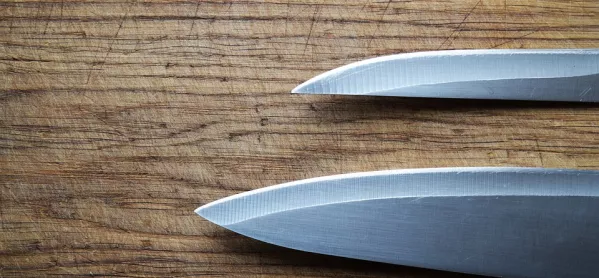A quarter of shops are selling knives to underage pupils, according to new figures which have prompted warnings that high street complacency could be adding to a “deadly problem”.
Figures published today showed that shop workers failed to check the age of mystery shoppers buying a knife in 26 per cent of 2,357 test sales last year.
Among shops classed as homeware or DIY stores, where 672 tests were carried out, 41 per cent sold the blades to mystery shoppers without checking identification.
This also happened in more than a fifth of supermarkets (21 per cent), where 1,685 test purchases were carried out.
The figures come amid heightening concerns about knife crime in schools.
Ofsted questions school leaders
Ofsted has launched a new survey of school leaders in London to ask how they are keeping children safe and how pupils are educated about the dangers of carrying a weapon.
The inspectorate’s regional director for London, Mike Sheridan, said the responses would not be used to help form judgements on individual schools.
Schools in the capital can take part anonymously, but can also choose to identify themselves or even have focused visits from Ofsted to help with the inspectorate’s research.
Earlier this year Tes revealed that more than a quarter of London secondaries have taken up an offer of free knife-detecting “wands”.
Mayor of London Sadiq Khan has described an “epidemic” of knife crime and last June offered free metal-detecting wands to all 498 secondary schools and 63 FE colleges in London.
The latest figures show that 150 schools and colleges have taken up the offer. The mayor’s office said more schools were expected to do so.
London’s deputy mayor for policing and crime, Sophie Linden, has welcomed Ofsted launching its knife crime survey.
She said the inspectorate had been asked to treat knife crime as a safeguarding issue during a Knife Crime Education summit organised by the London Mayor last year. She said she was glad Ofsted had “heeded this call.”
Today’s figures have been produced by retail age checking company Serve Legal.
The company’s director, Ed Heaver, said: “Against a backdrop of rising knife crime, news headlines about school-age victims and perpetrators are shockingly frequent. Our latest retail test data reveals that despite the principles of the government’s voluntary agreement on underage sales, which many retailers have agreed to adhere to, complacency on the high street could well be contributing to a deadly societal problem, with knives being sold to young people in plain sight.”
The company used young-looking 18- and 19-year-olds in the test purchases.
The figures show London actually had the lowest rate of shops failing to check customers’ ages when buying knives.
Regionally, the poorest rates were in Scotland and Northern Ireland, which both saw retailers failing 41 per cent of tests. London had the lowest proportion, with 18 per cent of tests failed.
The latest data published by the Office for National Statistics shows that 39,598 offences involving a knife or sharp instrument were recorded in 2017, a 22 per cent increase compared with the previous year, and the highest number registered since comparable records started in 2010.
In England, Wales and Northern Ireland, it is illegal to sell knives to under-18s, and in Scotland young people aged 16 to 18 can buy cutlery and kitchen knives.
A number of major retailers have also entered into a voluntary agreement to make sure under-18s cannot buy knives, including checking for age identification, reminding customers that they are age-restricted products and training staff.




